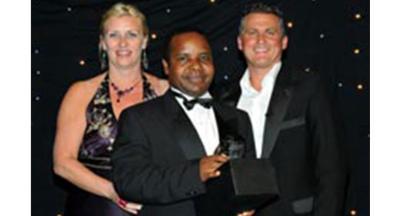Pioneering research into healing power of sugar
 Watch the BBC Midlands Today video feature (Windows Media Player video, opens in a new window)
Watch the BBC Midlands Today video feature (Windows Media Player video, opens in a new window)
Senior Lecturer Moses Murandu grew up in Zimbabwe and his father used granulated sugar to heal wounds and reduce pain when he was a child. But when he moved to the UK, he realised that sugar was not used for this purpose here.
Moses, 43, carried out research into the effect of sugar on patients’ wounds on the vascular ward at Selly Oak Hospital in Birmingham, funding the study himself for six months.
He has now been awarded the prestigious Fondation Le Lous Scientific Research Innovation Award and £25,000 to enable him to continue his innovative work.
Sugar can be used on wounds such as bed sores, leg ulcers and even amputations. It works because bacteria needs water to grow, so applying sugar to a wound draws the water away and starves the bacteria of water. This prevents the bacteria from multiplying and they die. Moses found that a 25% sugar concentration ensures the microorganisms cannot survive.
Mr Murandu, Senior Lecturer in Adult Nursing at the School of Health and Well Being, said: “Using granulated sugar in wounds has never been done in the UK before, although sugar paste has been used. When I was a child, my father used sugar or salt and I grew up without realising that something that works is not widely used.
“While salt is painful, sugar is not and reduces the pain drastically. The patients we have tested it on in the pilot study have said that they never knew such a simple method could make such a difference to their quality of life.
"I was happy for the patients who suffer from terrible and debilitating wounds with little hope of getting better, as this treatment can ease their pain.”
Jacqui Fletcher, Herve Le Lous Board Member, said: “Moses was awarded the prize not just because the quality of his proposal was excellent, but also because he challenged current thinking. In the UK we have a habit of saying 'Ah yes we know in countries that can't afford proper dressings they use other things, but when you are here you have the freedom and luxury of choosing a whole range of alternatives', but Moses didn't think that way. He takes the view that he used sugar very effectively, therefore why wouldn't it work equally well here? He should be commended for his tenacity in taking this project forward when many others would not even have started.”
Moses, from Edgbaston in Birmingham, was supported in his studies by Mr Malcolm Simms, consultant vascular surgeon at Selly Oak Hospital, who had worked in Uganda and witnessed the use of sugar there.
Mr Murandu submitted an abstract to the Fondation Le Lous detailing his study and the benefits for patients. As well as £25,000 over two years to further his research, Moses received a trophy and will also receive support from board member Carol Dealey, who is a Research Fellow at the University Hospital Birmingham NHS Foundation Trust and University of Birmingham.
Originally from Zimbabwe, Moses Murandu studied midwifery in South Africa and also studied in Atlanta, Georgia, before coming to the UK to study a Masters at Birmingham University, supported by Professor Colette Clifford. As well as lecturing at the University of Wolverhampton, he is currently studying for a doctorate at Birmingham.
Further information
Picture: Jacqui Fletcher, Herve Le Lous Board Member, Senior Lecturer at the University of Wolverhampton Moses Murandu and cricketer Darren Gough.
The Fondation Le Lous was established by Herve Le Lous, Chairman of Laboratoires Urgo. This non profit making foundation offers clinicians and researchers the opportunity of funding for the development of a local project which will be of benefit to the wound care community.
For media inquiries, contact Vickie Woodward in the Media Relations Office on 01902 322736 or 07973 335112.
For more information please contact the Corporate Communications Team.


/prod01/wlvacuk/media/departments/digital-content-and-communications/images-2024/240328-Varsity-Line-Up-Resized.jpg)
/prod01/wlvacuk/media/departments/digital-content-and-communications/images-18-19/220325-Engineers_teach_thumbail.jpg)
/prod01/wlvacuk/media/departments/digital-content-and-communications/images-2024/240404-Digital-Humanities-Training-Resized.jpg)
/prod01/wlvacuk/media/departments/digital-content-and-communications/images-2024/240320-Uzbekistan-Resized.jpg)
/prod01/wlvacuk/media/departments/digital-content-and-communications/images-2024/240229-The-Link-Resized.jpg)
/prod01/wlvacuk/media/departments/digital-content-and-communications/images-2024/240411-IYC-Resized.jpg)